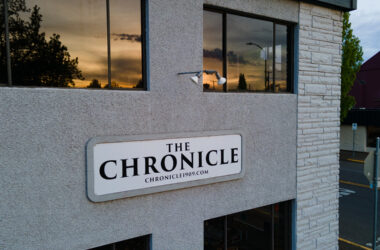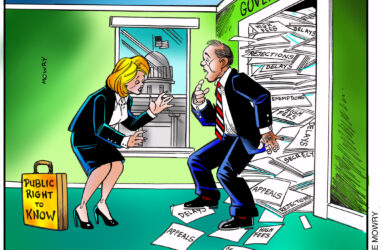
Ten years, a full decade. Is that a long time?
If you live to be 90, that makes nine of them. Throw out the first and last ones, and that leaves us with seven good decades in our lives. Anything more is a true blessing. There are plenty of good souls who received less.
Is it a long time? Ten years?
The iPad – a vital tool in distance learning today – was announced by Apple in 2010. Instagram was founded in 2010. What does the world look like 10 years from today’s cutting-edge technology around prosthetics, artificial intelligence, Siri, Alexa, self-driving cars, reusable rockets boosters, medical breakthroughs?
The possibilities boggle the mind, and can leave us feeling small and helpless.
Of course, we’re not helpless. And we can loom large in our community by volunteering – with schools, nonprofits, faith-based institutions and other organizations.
And here’s another way to make a big impact that takes less than 10 minutes: Fill out the U.S. Census online.
Imagine doing something that takes only 10 minutes, and has 10 years of influence. Talk about return on investment.
We’re in the final stages now of the 2020 Census, a survey we take once each decade just as Congress mandated in the U.S. Constitution. The data collected helps determine how our tax dollars – many hundreds of millions of dollars – are spent in the decade ahead.
The math is easy to understand. So are the consequences. Count accurately, and get the most out of our tax dollars on what matters most in our community – more and better healthcare, education, transportation, parks, small-business support, public safety, and so forth.
Undercount, and receive less of our tax dollars for all of those things … for the next 10 years.
Brenda Wilson, executive director for the Lane Council of Governments, is an advocate for this survey effort, a natural fit for someone leading governments across the state who are all in need of revenue to support vital services. She’s been working with the U.S. Census Bureau for the past few years, verifying addresses and training field workers who are going door-to-door now in these final weeks. The survey closes Sept. 30.
Oregon’s early “self-response” was 67.2%, up from 66.9% in 2010. Of that total response rate, 55.9% has been online.
Wilson, in her eighth year with LCOG, clearly has the experience to lead a team like this. There are more than 700 “councils of government” organizations in the country; Lane has the second-largest in Oregon. She is used to large-scale logistics. Helping plan, promote and then execute is in her wheelhouse. Wilson and her team have been promoting credible information about the census for months. “We’ve been providing talking points, handouts, and brochures to cities throughout the area,” she said. “Schools have access to a website we created that has educational material regarding the census, and we placed flyers in kids’ ‘Friday folders.’”
The campaign has tried to ease concern over privacy, too. “We want people to know we’re not interested in me and where I live; it’s trying to count the household. It’s not about personally identifying anyone,” she said.
She’s heard the concerns, of course. People hesitant to surrender any detail of their life. “The information we collect is 100 percent confidential,” she states with a no-nonsense tone.
The message is working. Lane County has a 69.3% response rate (57.7% online), up from 68.8% in 2010.
Of course, it’s worth noting that you can complete the online survey in less than 10 minutes and avoid anyone coming to your door or calling your home.
Misty Slater, a regional media specialist for the bureau, said before working at the census bureau she hadn’t realized “how central it was to the fabric of a community.” She said training has been going on in our community for two years, and echoed Wilson regarding broad distribution of information. “We’ve included information in bags at food banks.”
Wilson emphasized how heavily senior services rely on census data. Think about how many of us might require greater senior services 10 years from now. Ten minutes; 10 years.
“It impacts Medicare and SNAP benefits for seniors throughout the county. Think of it this way,” she explains. “There is a senior home with 100 people in it, but only 80 people are counted. That home must then operate with revenue for only 80 people during the next 10 years.”
Wilson’s work has been paying off in Lane County and our communities. The numbers are good, and “Lane County has been ahead on all of its milestones,” she said. This is the first year residents can fill out the form online – it takes only a matter of minutes. “It’s been amazing,” Slater said of the online response so far.
A look at our local numbers: Springfield response is at 71.8% (59.9% online), up from 69.4 in 2010; Creswell is at 70% (61.3%), up from 68.2% in ’10; and Cottage Grove is at 68.7% (50.3% online), down from 69.5% in ’10.
Now we’re at the stage where follow-up phone calls and at-home visits are needed to complete the survey. Local people – your neighbors and community members – are working as survey-takers, doing their best to collect this vital information before it’s too late. They are easy to identify, carrying a photo ID badge that includes an expiration date and watermark seal. They will never ask for a donation, or money for any reason. You can call the Los Angeles Regional Census Bureau on the spot, and verify everything. Its phone number is 213-314-6500.
“I haven’t heard anyone say they’ve had a bad experience” with the field team, Wilson says.
Slater added: “They’ve been trained in COVID-19 safety procedures; they knock on the door, stand back six feet, identify themselves … nobody touches the census-taker’s phone. It’s respectful of everyone’s safety.”
Many of the census’ advantages are obvious, and tangible. Here’s something else to consider: It influences Congressional representation. If Oregon were to excel as census respondents, and other states were to return fewer surveys, it could lead to another seat in Congress for our state. More accurate-and-complete data could lead to a better outcome in our neighborhood and influence in Washington, D.C.
As Slater said, “For such a huge impact, it’s amazing how much a simple ‘Please raise your hand and be counted’ act can be.”
Noel Nash is publisher of The Chronicle.







